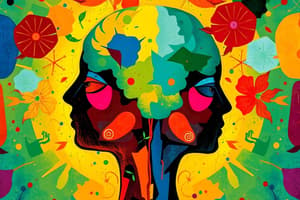Podcast
Questions and Answers
What emotional outcome is associated with success at the stage of life characterized by reflection?
What emotional outcome is associated with success at the stage of life characterized by reflection?
- Fear of the future
- Bitterness towards others
- Feelings of sadness
- Feelings of wisdom (correct)
What do individuals who reflect on their lives with regret tend to fear?
What do individuals who reflect on their lives with regret tend to fear?
- Facing criticism for their choices
- Being judged by others
- Not living up to societal standards
- Their lives ending without achieving their goals (correct)
Which of the following feelings is NOT a result of failure at this stage of life?
Which of the following feelings is NOT a result of failure at this stage of life?
- Satisfaction with accomplishments (correct)
- Despair
- Regret
- Bitterness
What is a probable emotional response for people assessing a well-lived life?
What is a probable emotional response for people assessing a well-lived life?
What likely feeling does NOT accompany a life viewed with contentment?
What likely feeling does NOT accompany a life viewed with contentment?
What period is defined as early adulthood?
What period is defined as early adulthood?
Which psychosocial issue is primarily associated with Erik Erikson's theory?
Which psychosocial issue is primarily associated with Erik Erikson's theory?
During which life stage do individuals begin to notice the effects of aging most prominently?
During which life stage do individuals begin to notice the effects of aging most prominently?
What is a significant characteristic of the 'young' group in late adulthood, aged 45-65?
What is a significant characteristic of the 'young' group in late adulthood, aged 45-65?
What does the principle of cephalocaudal state about human development?
What does the principle of cephalocaudal state about human development?
Which of the following theories contributed frameworks for understanding human developmental stages?
Which of the following theories contributed frameworks for understanding human developmental stages?
What are emerging adults at greatest risk for during their peak physiological phase?
What are emerging adults at greatest risk for during their peak physiological phase?
What is the main outcome of the initiative vs. guilt stage for children who succeed?
What is the main outcome of the initiative vs. guilt stage for children who succeed?
Which of the following best describes growth according to the content?
Which of the following best describes growth according to the content?
What age range does the Industry vs. Inferiority stage typically cover?
What age range does the Industry vs. Inferiority stage typically cover?
How does the principle of proximodistal development differ from cephalocaudal development?
How does the principle of proximodistal development differ from cephalocaudal development?
What age range denotes late adulthood?
What age range denotes late adulthood?
Which of these aspects is primarily a concern in early adulthood?
Which of these aspects is primarily a concern in early adulthood?
Which outcome is associated with the successful resolution of the Identity vs. Confusion stage?
Which outcome is associated with the successful resolution of the Identity vs. Confusion stage?
What is the primary distinction between growth and development?
What is the primary distinction between growth and development?
At what stage does growth primarily stop according to the information provided?
At what stage does growth primarily stop according to the information provided?
What feelings do children experience if they receive little encouragement during the Industry vs. Inferiority stage?
What feelings do children experience if they receive little encouragement during the Industry vs. Inferiority stage?
Which statement correctly reflects the relationship between growth and development?
Which statement correctly reflects the relationship between growth and development?
What is a common outcome for children who exert too much power in the initiative vs. guilt stage?
What is a common outcome for children who exert too much power in the initiative vs. guilt stage?
Which of the following is critical for a teen's successful passage through the Identity vs. Confusion stage?
Which of the following is critical for a teen's successful passage through the Identity vs. Confusion stage?
Which of the following is a characteristic of the cephalocaudal development pattern?
Which of the following is a characteristic of the cephalocaudal development pattern?
What does development primarily aim towards, as described in the information?
What does development primarily aim towards, as described in the information?
What is the central task for children during the initiative vs. guilt stage?
What is the central task for children during the initiative vs. guilt stage?
What does Erikson refer to as 'fidelity' in the context of the Identity vs. Confusion stage?
What does Erikson refer to as 'fidelity' in the context of the Identity vs. Confusion stage?
What age range defines Adolescence?
What age range defines Adolescence?
Which developmental stage starts at 18 and lasts until 25?
Which developmental stage starts at 18 and lasts until 25?
During which period do children begin formal schooling?
During which period do children begin formal schooling?
What characterizes the Infancy and Toddlerhood stage?
What characterizes the Infancy and Toddlerhood stage?
What does the principle of plasticity indicate about human development?
What does the principle of plasticity indicate about human development?
Which of the following best describes the relationship between development and growth?
Which of the following best describes the relationship between development and growth?
At what age does Early Adulthood begin?
At what age does Early Adulthood begin?
Which domain of development involves changes in intelligence and problem-solving skills?
Which domain of development involves changes in intelligence and problem-solving skills?
Which stage is often referred to as the preschool years?
Which stage is often referred to as the preschool years?
What characterizes the multidimensionality of human development?
What characterizes the multidimensionality of human development?
What change marks the beginning of Adolescence?
What change marks the beginning of Adolescence?
What is the primary focus of the social and emotional domain in human development?
What is the primary focus of the social and emotional domain in human development?
Which period follows the end of Adolescence?
Which period follows the end of Adolescence?
What statement is true regarding the growth rate in humans?
What statement is true regarding the growth rate in humans?
Which principle indicates that change in human development occurs in various directions?
Which principle indicates that change in human development occurs in various directions?
Elizabeth Hurlock defined development primarily as:
Elizabeth Hurlock defined development primarily as:
Flashcards
Development
Development
Changes in the organism as a whole, encompassing physical, emotional, and intellectual transformations.
Growth
Growth
Refers to an increase in body size and organ mass, typically driven by cell multiplication and growth.
Plasticity
Plasticity
The ability of individuals to adapt and change throughout their lives, influenced by experiences.
Multi-directionality of Development
Multi-directionality of Development
Signup and view all the flashcards
Multidimensionality of Development
Multidimensionality of Development
Signup and view all the flashcards
Physical Domain
Physical Domain
Signup and view all the flashcards
Cognitive Domain
Cognitive Domain
Signup and view all the flashcards
Social and Emotional Domain
Social and Emotional Domain
Signup and view all the flashcards
What is the principle of cephalocaudal development?
What is the principle of cephalocaudal development?
Signup and view all the flashcards
Explain the proximodistal principle of development.
Explain the proximodistal principle of development.
Signup and view all the flashcards
Distinguish between growth and development.
Distinguish between growth and development.
Signup and view all the flashcards
What is the principle of sequentiality in development?
What is the principle of sequentiality in development?
Signup and view all the flashcards
What does growth generally refer to?
What does growth generally refer to?
Signup and view all the flashcards
What does development generally refer to?
What does development generally refer to?
Signup and view all the flashcards
How do growth and development differ in their duration?
How do growth and development differ in their duration?
Signup and view all the flashcards
What are the driving forces behind growth and development?
What are the driving forces behind growth and development?
Signup and view all the flashcards
Infancy and Toddlerhood
Infancy and Toddlerhood
Signup and view all the flashcards
Early Childhood
Early Childhood
Signup and view all the flashcards
Middle and Late Childhood
Middle and Late Childhood
Signup and view all the flashcards
Adolescence
Adolescence
Signup and view all the flashcards
Emerging Adulthood
Emerging Adulthood
Signup and view all the flashcards
Early Adulthood
Early Adulthood
Signup and view all the flashcards
Middle Adulthood
Middle Adulthood
Signup and view all the flashcards
Late Adulthood
Late Adulthood
Signup and view all the flashcards
Erik Erikson's Theory of Psychosocial Development
Erik Erikson's Theory of Psychosocial Development
Signup and view all the flashcards
Psychosocial Crises
Psychosocial Crises
Signup and view all the flashcards
Dynamic Nature of Development
Dynamic Nature of Development
Signup and view all the flashcards
Wisdom
Wisdom
Signup and view all the flashcards
Despair
Despair
Signup and view all the flashcards
Life Review
Life Review
Signup and view all the flashcards
Ego Integrity vs. Despair
Ego Integrity vs. Despair
Signup and view all the flashcards
Initiative vs. Guilt
Initiative vs. Guilt
Signup and view all the flashcards
Industry vs. Inferiority
Industry vs. Inferiority
Signup and view all the flashcards
Identity vs. Role Confusion
Identity vs. Role Confusion
Signup and view all the flashcards
Intimacy vs. Isolation
Intimacy vs. Isolation
Signup and view all the flashcards
Generativity vs. Stagnation
Generativity vs. Stagnation
Signup and view all the flashcards
Trust vs. Mistrust
Trust vs. Mistrust
Signup and view all the flashcards
Autonomy vs. Shame and Doubt
Autonomy vs. Shame and Doubt
Signup and view all the flashcards
Study Notes
Human Growth and Development
- Human development is a multidirectional journey, involving gains and losses across the lifespan.
- Key principles underpinning understanding include lifelong change, multi-directionality, multidimensionality, and plasticity.
- Development encompasses physical, cognitive, and social/emotional domains.
- Physical development includes changes in height, weight, motor skills, sensory abilities, and susceptibility to illness.
- Cognitive development encompasses changes in intelligence, perception, problem-solving, memory, and language.
- Social/emotional (psychosocial) development focuses on emotions, self-perception, and interpersonal relationships (families, peers, and friends).
- Development is characterized by plasticity, meaning characteristics are pliable and influenced by early experiences.
- Maturation is the developmental process that occurs independent of learning.
- Growth is the increase in mass and size of the body and its organs.
- Growth occurs through cell multiplication and increases in intracellular substances.
- Growth is continuous but varies in rate throughout life, fastest until maturity.
- Ossification is bone formation, crucial for skeletal stability.
- Stages of human growth start in fetal life, complete by adolescence (different bone types).
- Growth is reflected in height and weight increase.
- Adolescence is a period of significant growth spurt (height and weight) and sexual maturation (puberty).
- Timing and speed of changes are influenced by heredity and environment.
- Change in size and function of internal organs happens alongside physical growth.
- Maturation is a key aspect of development, taking place independently of specific experience.
Stages of Development (Prenatal-Adulthood)
- Prenatal stage: conception to birth.
- Infancy and Toddlerhood: birth to age two.
- Early Childhood: age two to six.
- Middle and Late Childhood: age six to puberty.
- Adolescence: onset of puberty to age 18.
- Emerging Adulthood: age 18 to 25.
- Early Adulthood: age 25 to 40-45.
- Middle Adulthood: age 40-45 to 60-65.
- Late Adulthood: age 65 onward.
Erikson's Psychosocial Theory
- Erik Erikson's theory emphasizes psychosocial development across the entire lifespan.
- Stages include conflicts that impact self-identity and competence each stage provides a chance for growth, or failure.
- Stages:
- Trust vs. Mistrust (Infancy)
- Autonomy vs. Shame/Doubt (Early Childhood)
- Initiative vs. Guilt (Preschool Years)
- Industry vs. Inferiority (School Years)
- Identity vs. Role Confusion (Adolescence)
- Intimacy vs. Isolation (Early Adulthood)
- Generativity vs. Stagnation (Middle Adulthood)
- Integrity vs. Despair (Late Adulthood)
Studying That Suits You
Use AI to generate personalized quizzes and flashcards to suit your learning preferences.



